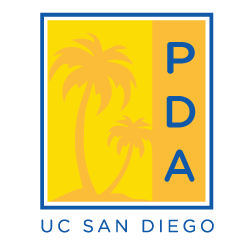
Jeffrey D. Esko, Ph.D.

- Interview Overview
Interview Overview
Interviews by: Ann Lin
Editing: Alexandra Bortnick
1. Where did you attend your undergrad and graduate studies?
I attended the University of Illinois in Urbana-Champaign as an undergrad and the University of Wisconsin in Madison for my PhD, both in Biochemistry. I was a post-doc at UCLA.
2. Could you describe your current job profile?
Awesome, I get to spend most of my time thinking about ideas with very bright graduate students and post-docs. I spend a good part of time writing grants and papers, talking to colleagues, and planning experiments. Administration is one of the less interesting, but necessary, part of my job.
3. How many years have you been at UCSD?
More than eighteen years. I was a professor at University of Alabama at Birmingham (UAB) for thirteen years before my recruitment to UCSD.
4. What made you decide to become a professor?
I was always inclined toward science, even as a kid. I anticipated going to medical school, but didn’t like the competitive, at times cutthroat atmosphere amongst pre-med students. When I took a biochemistry lab at Illinois, the director of the course collared me one day, literally took me out of class and walked me over to a young Assistant Professor’s office who had just started his lab. That began my introduction to academic science, my first desk and lab bench, and my first two publications. I never looked back. I think in general we follow our successes, going through doors that open for you.
5. Apart from the research you conducted, do you feel like anything in particular has helped you to acquire your current position?
Hard work, good ideas, really talented trainees that were equally motivated, and a network of colleagues that I respect and that respect me.
6. Could you list some of the most striking similarities and differences between your postdoc and current position?
I had an unusual post-doctoral experience; I had a Fellowship at the Molecular Biology Institute at UCLA. I was independent, got my first grants there, and had total control over my small lab and my destiny. Typically, post-docs don’t have as much freedom as I had, but because of my experience I try to create a similar environment in my lab, with the caveat that we have to stay focused and productive in order to remain funded. Another major difference is that as a post-doc you continue to receive encouragement from your mentor(s), whereas as a Professor you usually give more encouragement than you receive.
7. What do you do when you’re teaching or in the lab?
Enjoy the experience. I try to create pictures through words and communicate the joy in my work.
8. What has been the biggest challenge you’ve face in your career and how did you overcome such challenge?
Funding, facing the fact that I am responsible for the well-being and promotion of the people in my lab, and balancing my family life with my work. Work hard, play hard.
9. Do you have any advice for postdocs who want to pursue research in academics or outside of academics?
Follow your instincts, but have realistic expectations. Recognize your strengths and weaknesses emphasize the former and work on the latter. Seek a position that fits your life view. We tend to think that the only worthy job is one in academia, but the reality is that there are many kinds of jobs that draw on the problem solving skills that we develop as students of science and technology.
